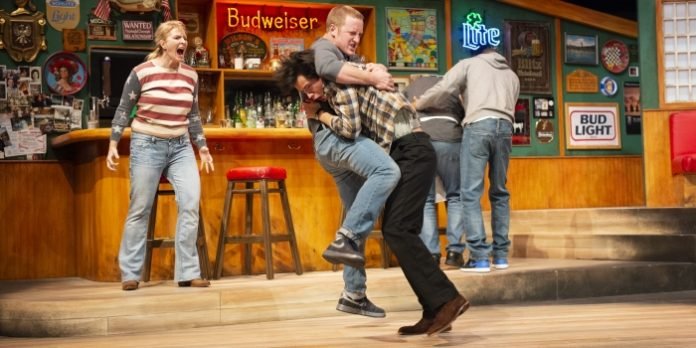As the Canadian premiere of Sweat opens in Vancouver at the Arts Club’s Stanley Theatre, New York’s The Public Theater is just wrapping a tour through the very territory in which it is set.
According to an October 2nd Washington Post story, that American rust belt tour of Lynn Nottage’s working class drama has definitely left a mark. For those of us north of the border though, while there is a definite empathy, it doesn’t quite provoke the same emotional resonance it appears to be having on our neighbour’s to the south.
But it is also easy to oversimplify Nottage’s Pulitzer Prize-winning script which chronicles the demise of factory jobs in Reading, Pennsylvania.
Based on interviews Nottage undertook with actual residents of the area, at its surface, Sweat laments a time when blue collar union jobs were the mainstay of many communities. Set between 2000 and 2008, it is a period when generations of families, once believing they had work for life, soon found themselves at the mercy of globalization, NAFTA, and corporate greed.
Along with the real economic pressures from the loss of work, Nottage adds the inevitable conflict between families and friends who suffer the fallout as they find themselves on both sides of the picket line.
Dig a little deeper though and Nottage’s drama can also be viewed in the more contemporary context of Trump’s MAGA rhetoric, and as a mirror to the racial discord continuing to plague the United States. The problem though is these bigger conversations all play second fiddle to an often repetitive 2 ½ hours, never quite going deep enough to be fully satisfying. More importantly though, it struggles in finding its relevancy in our predominantly white collar city.
A co-production with Edmonton’s Citadel Theatre, the play will move to the prairie city in January. Perhaps with its closer proximity to the Alberta oil fields, Sweat will find an audience more attuned to its central message. Or more likely, it will not happen until the play finds its way closer to our country’s own rust belt of southwestern Ontario.

Even as Sweat fails to completely engage, there are still some terrific performances in this production.
Chief among them is Ashley Wright who, along with six of the eight actors on stage are making their Arts Club debuts, largely because of the show’s status as a co-production. Wright not only creates a distinctive physical characterization to his role as bartender Stan, but he also manages to breathe new life into the tired “wise bartender” cliché.
While most of this cast eventually find Nottage’s natural tone, Marcia T House and Nicole St Martin find an almost immediate realistic connection between their two characters, in a friendship that quickly becomes strained, and Chris W Cook and Andrew Creightney are believable as the two younger friends.
Under Valerie Planche’s direction, there are no half measures and much of the time these characters are amped to eleven; when you’re already at a peak it makes any subtleties in performance near impossible.
Shizuka Kai provides a realistic bar for much of the action, with two turntables on either side allowing for relatively quick, although underused, transitions to other locations.
On opening night gremlins played havoc with Daniela Masellis’ lighting in the penultimate scene, but otherwise hers is a straightforward design.
Sound designer Mishelle Cuttler helps to set the shifts in time with various pop songs inside the play’s non-linear story, although the music coming from the jukebox did overstay its welcome at times.
In the Washington Post article on The Public Theatre’s touring production, Peter Marks writes of one Erie, Pennsylvania resident who, when asked why he was crying as he watched Sweat, said it was because he recognized it as being his story that was being told.
But while every playwright dreams of a similar reaction to their work, in Sweat there is a universality, at least from my privileged white-collar lens, that is missing.
Sweat by Lynn Nottage. Directed by Valerie Planche. An Arts Club Theatre Company co-production with Citadel Theatre. On stage at the Stanley Industrial Alliance Stage (2750 Granville St, Vancouver) until November 18. Visit artsclub.com for tickets and information.
Editors Note (26 October): This review was edited to reflect Mishelle Cuttler as the production’s sound designer.

